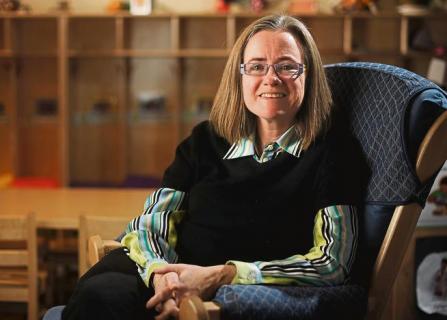
 We’ve had our eye on Helen Thorpe since 2009 when her book Just Like Us: The True Story of Four Mexican Girls Coming of Age in America won the Colorado Book Award. It didn’t surprise us to see her latest book skyrocket to the top of bestseller lists. Soldier Girls was named the number one nonfiction book of 2014 by Time, and Thorpe was invited on John Stewart’s The Daily Show for an exclusive interview. It’s not every day that Colorado authors appear on high-profile TV shows!
We’ve had our eye on Helen Thorpe since 2009 when her book Just Like Us: The True Story of Four Mexican Girls Coming of Age in America won the Colorado Book Award. It didn’t surprise us to see her latest book skyrocket to the top of bestseller lists. Soldier Girls was named the number one nonfiction book of 2014 by Time, and Thorpe was invited on John Stewart’s The Daily Show for an exclusive interview. It’s not every day that Colorado authors appear on high-profile TV shows!
Accolades aside, Helen Thorpe is also a genuinely lovely person and an immensely talented and thoughtful instructor. We’re thrilled to welcome her to the Lighthouse faculty, beginning this session with her Reading as a Writer workshop, “Dave Eggers Does Nonfiction.”
Why did you choose Dave Eggers’ Zeitoun for your Reading As a Writer workshop?
I wanted to teach Zeitoun for several reasons. I think it is instructive both as a piece of writing and as a book that raises questions of social justice. Also, I relied on Zeitoun when I was writing Soldier Girls—it was one of the books that I chose as a model narrative, when I was figuring out how to structure my book. Because I studied it closely, to see how Eggers put together his story, I have observations that I can share with other writers that may be instructive. And finally, I knew that this fall would be the tenth anniversary of Hurricane Katrina, and I thought that what happened in New Orleans would be in the news, and that therefore the book would resonate with readers all over again.
In what ways does your book Soldier Girls intersect with Eggers’?
Both books are written from the close third person perspective, about events that every reader is presumably already familiar with. Readers will have heard of Hurricane Katrina before they read Zeitoun, so they watch the storm coming and they know more than the character Zeitoun knows, in terms of what will happen in his immediate environment. Similarly, before they read Soldier Girls, readers know that the United States went to war in Afghanistan and Iraq, and so the reader watches those conflicts coming and knows more about what will happen than do the characters in my book. This creates really interesting opportunities to create suspense, for the writer.
Why should fiction and memoir writers read narrative nonfiction? What can they learn?
In Zeitoun, Dave Eggers uses techniques borrowed from fiction to create greater suspense than is typically found in journalistic writing. In that way, he takes narrative nonfiction to a higher level. Practitioners of either nonfiction or fiction—or memoir—can learn from what he does in this book, because his methodology can be applied in all of these forms.
What authors or books do you think deserve more recognition?
I am a huge fan of the narrative nonfiction canon. My list of authors who deserve more recognition would include: George Orwell, A. J. Liebling, John Hersey, Janet Flanner, Lillian Ross, Adrian Nicole LeBlanc, and Katherine Boo. These authors have achieved acclaim but I think in today's busy world we are in danger of forgetting to read them. And I want to remind other writers of how much we have to learn from these classics.
Did anything change for you, as a writer, after appearing on The Daily Show with John Stewart for your book Soldier Girls?
Not really! Except that a bunch of weirdos wrote strange stuff about me on Amazon! Otherwise, it was business as usual.
Anything else you would like your future students to know about your upcoming workshop?
I am open to students who are nonfiction writers, or who prefer to write fiction, or students who just love to read want to take a class about a really fascinating book and meet other people who love to read as well. Everybody's welcome!
 Helen Thorpe is an award-winning journalist whose work has been published in The New York Times, The New Yorker, Texas Monthly, and 5280. Her first book, Just Like Us, won the Colorado Book Award and was named one of the best books of the year by the Washington Post. Her second book, Soldier Girls, was published in 2014. Time named it the number one nonfiction book of the year.
Helen Thorpe is an award-winning journalist whose work has been published in The New York Times, The New Yorker, Texas Monthly, and 5280. Her first book, Just Like Us, won the Colorado Book Award and was named one of the best books of the year by the Washington Post. Her second book, Soldier Girls, was published in 2014. Time named it the number one nonfiction book of the year.
Thorpe's 4-week workshop, Dave Eggers Does Non-Fiction, starts on Tuesday 8/18.

